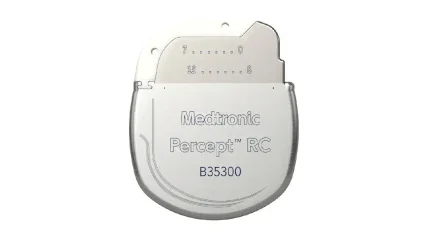
Medtronic has received the US Food and Drug Administration (FDA) approval for its BrainSense adaptive deep brain stimulation (aDBS) system to treat Parkinson’s disease.
The approval also includes the company’s BrainSense Electrode Identifier (EI) system, which helps patients reduce the time required to programme their DBS settings.
With BrainSense EI, clinicians can conduct accurate and precise initial programming, 85% faster than traditional electrode selection.
Deep brain stimulation (DBS) functions similarly to a pacemaker but targets the brain using an implanted neurostimulator that delivers electrical signals to specific regions of the brain.
Medtronic has developed the aDBS technology by enhancing its Percept DBS neurostimulators with BrainSense Adaptive technology.
The aDBS technology personalises therapy based on real-time brain activity, both in clinical settings and daily life, minimising the need for manual stimulation adjustments.
Medtronic neuromodulation business president Paolo Di Vincenzo said: “Our BrainSense technology provides unique and clinically important insights that no other DBS system can offer, using a person’s own brain signals to provide a window into their condition, in real time, over time.
“Our focus has always been on creating solutions that work for real lives, not just standalone symptoms. aDBS reflects that commitment, bringing a new expectation in Parkinson’s treatment.”
Medtronic has been developing a sensing-enabled DBS system for more than a decade, using BrainSense technology to detect and classify different brain signals.
The company is incorporating brain-computer interface (BCI) technology into DBS therapy, to develop advanced products to treat Parkinson’s symptoms.
Its BrainSense Adaptive DBS is offered to current and future Medtronic DBS patients with Parkinson’s who have been implanted with a Percept neurostimulator.
Currently, more than 40,000 DBS patients are using Medtronic’s Percept devices worldwide.
Medtronic neuroscience portfolio president and executive vice president Brett Wall said: “Medtronic is the only company in the world to offer an adaptive DBS system that dynamically adjusts therapy in real-time.
“This new era in Parkinson’s care represents more than a decade of intentional innovation, ushering in personalised neuromodulation at a scale that responds to a patient’s changing needs, equipping clinicians with unparalleled insights, and setting a new standard for DBS therapy.”
Medtronic neuromodulation portfolio vice president and general manager Amaza Reitmeier said: “With this FDA approval, which quickly followed our CE Mark, we are taking another significant step forward in delivering sensing-enabled personalized treatments to people with Parkinson’s.”
The Medtronic Adaptive DBS Algorithm for Personalised Therapy in Parkinson’s Disease (ADAPT-PD) trial underscores the potential of aDBS in clinical practice.
The ADAPT-PD study was conducted as a multi-centre, single-blind, randomised, global crossover study between two modes of aDBS.
The trial evaluated the safety and effectiveness of chronic dual- and single-threshold aDBS modes compared to continuous DBS (cDBS) for eligible Parkinson’s patients.
Medtronic developed the system in collaboration with more than a dozen top neurologists and neurosurgeons from academic institutions worldwide.
The institutions include Stanford University School of Medicine, University of California San Francisco, Massachusetts General Hospital and Amsterdam University Medical Centre.






